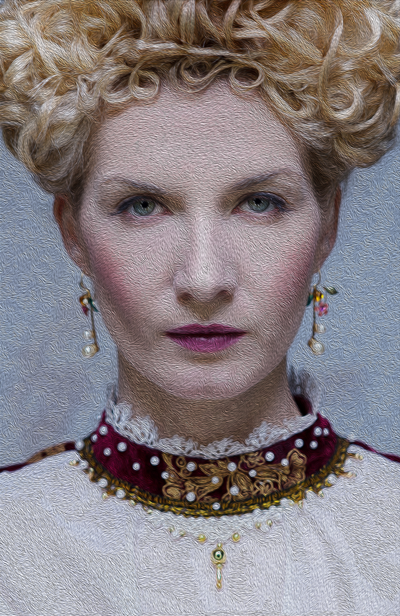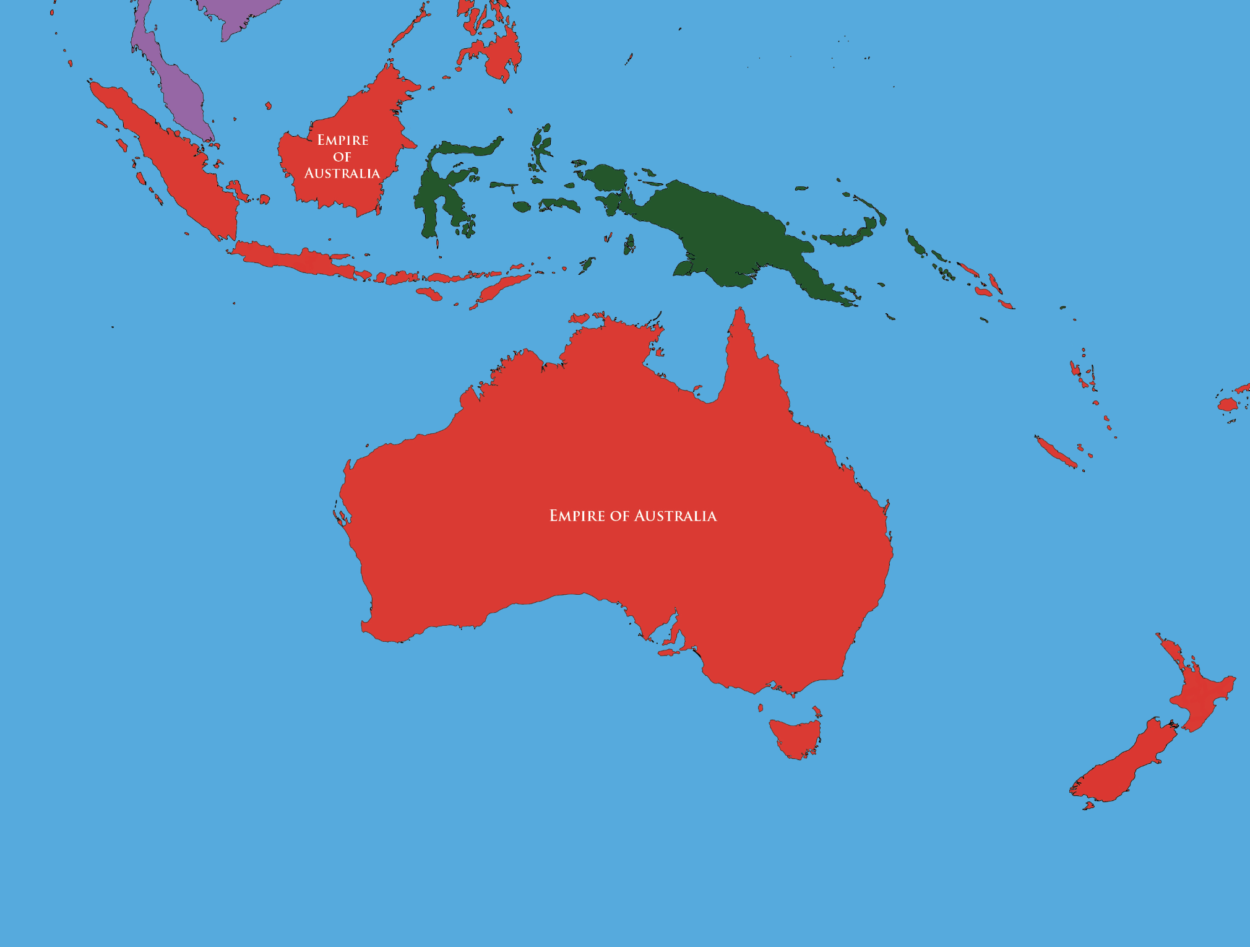What is the Empire of Australia
The Empire of Australia, also known as the Empire of Aotearoa, is a nation-state with origins in North Aotearoa. It is the largest nation-state in the world and is considered by many to be a “superpower” as the only nation with the power to deploy its military forces to any point on the planet within two hours.
The Empire of Australia has been ruled by a succession of Empresses, all named Eleanor.
Its head of state and head of government is Empress Eleanor the Thirty-Third. The capital city of the Empire of Australia is New Bordeaux, on the southern tip of the north island of Aotearoa.
Founding of the Empire of Australia
In 1149 of the Common Era, Eleanor, Duchess of Aquitaine and Queen of France set forth on Crusade with her tyrannous husband, Louis VII.

Earlier that year, to pay for his crusade, Louis had begun taxing the people of Aquitaine at double the normal rate and the people were chafing under the crown’s imposed economic misery.
Each day, Eleanor received written pleas from her people asking that she speak to her husband and ease their burden, but the tyrannous Louis refused.
Such was the lot of women, even Queens, in France in 1149.
After a years-long journey, they arrived in the holy land, where Louis engaged in one disastrous campaign after another.
Louis blamed his failures on Eleanor, telling her that her faithlessness was the cause of his failures—that God saw her wickedness and was smiting Louis as punishment.
Eleanor knew the truth, however, for Louis was not merely a terrible husband and an incompetent ruler, but was also one of the worst military commanders the world had ever seen.
Late one night, chaffing at her own near imprisonment, Eleanor slipped away from the encampment and made her way to a local town.
It was a trading village on the sea, and in this town was an inn. Eleanor slipped inside to get an understanding of the locals.
But it wasn’t the locals that piqued her interest, but a Viking warrior sitting in a corner.
Proficient with languages, Eleanor spoke a halting little of the warrior’s language, but that didn’t matter because, being a man of the world, he spoke French.
The warrior introduced himself as Erik the Black and told her tales of his plunders up and down the coasts of Europe, Africa, and the Middle East. He spoke of the Far East and the wonders there.
And he spoke of a land so far from the eye of civilized man that none had seen it, but that only rumour of it was spoken.
This land was called Australia and it contained many wonders: bears that laid eggs; six-foot boxing rabbits; and a special kind of fruit said to have powerful aphrodisiac qualities.
A thought occurred to Eleanor. Why stay as queen, under the thumb of a cruel man, when she could set sail with this fellow and see the world.
And so, she did.
After more than a year-long journey and two massive cyclones, the Viking raiding party arrived in Australia.
Their supplies gone, the party quickly had to find shelter, food and water. They settled in for a respite along a wonderful sandy beach.
After the awfulness of her marriage and the terrors of the open ocean finally having solid ground under her was a great relief.
Eleanor set to work exploring the wonders of this new land.
There were indeed egg-laying bears and upright walking rabbits, but the famed fruit was nowhere to be seen.
It was the year 1151 of the Common Era and Eleanor thought more and more of her people back home and of her own plight in the world as a woman.
What if, she mused, there was a power in the world run by women. What if there were an Empire of unmatched might, run by herself and her heirs, which could serve as a counter-balance to the world dominated by cruel men?
It was in this year, the start of the Australian summer, on the 1st of December, that Eleanor, Duchess of Aquitaine, founded the Empire of Australia.
To this day, in every home of the Empire of Australia, December 1st is celebrated every year as Empire Day.
The Current State of the Empire
There have been 33 Empresses of Australia, each bearing the name Eleanor.
Over the years the Empire has expanded to colonies and territories throughout the globe. Its holdings reach as far north as Greenland, Iceland, and Svalbard and as far south as Antarctica. It maintains colonies on every continent.
It is said that the sun never sets on the Empire of Australia. The Empire truly is the only world superpower.
The current Empress, sometimes referred to by the shorthand E33, began her reign on Empire Day of the year 2014 of the common era, at the age of 25.
You can learn more about Eleanor XXXIII here.
Government of the Empire of Australia
The Government of Australia is an autocracy helmed by the Empress of Australia who sets general, broad policies of the Empire which are then administered by a series of councils, conventions, and bureaus.
In order of importance, the councils of the Empire of Australia are:
- The Privy Council
- The Foreign Council
- The Economic Council
- The Justice Council
- The Defense Council
- The Education Council
- The Environment Council
- The Arts Council
- The Governor’s Council
Culture of the Empire of Australia
Language
The main languages of the Empire are English, French, Maori, and Portuguese. All four languages are taught in school and in practice, nearly every citizen of the Empire can speak at least of little of all four. It is rare to find a citizen who cannot speak three of the four well and many prefer an amalgamation of the four languages in which they pick and choose words from each language that best suit their meaning. Maori is the language of the Court and official proceedings are conducted in Maori. Portuguese is the language of trade with most contracts and business dealings being conducted in Portuguese. English and French are the most common languages of daily life.
Education
Communal education starts at age two and continues for fourteen required levels for both sexes. Beyond that is university education, which is considered optional and which is largely the realm of women who enrol at a much higher rate than men.
University education requires specialization in a particular field of choice. These fields are:
- Education & Learning
- Early Development
- Middle Development
- Late Development
- Executive Pedagogy
- Creative Culture
- Music
- Dance
- Theatre
- Art
- Physical Design
- Literature
- Architecture
- Numbers & Money
- Economics
- Mathematics
- The Material World
- Physics
- Non-Animal Biology
- Chemistry
- Geology
- Animal Bodies & Medicine
- Human Biology
- Animal Biology
- Medicine & Healing
- Psychology
- Human Interaction
- Macro Interactions
- Small-Group Dynamics
- Interpersonal Dynamics
- Historical Studies
- Language and Communication
- Language Pedagogy
- Communication Technology
- Civil Society
- Justice Theory
- Government Theory
- Civil Service
- The Environment
- Systems Engineering
- Structural Engineering & Architecture
- The Natural World
Religion
Long hostile to the Catholic Church, the Empire of Australia has had only limited influence from any religious tradition but especially “mainstream” Christianity in the forms of Catholicism and Calvinism. This influence reached its nadir in the 1600s with the outlawing of the practice of religion in all but the Holy Protectorate of the Empire of Australia.
Since the 1600s, religious influence in the Empire has been curtailed with only about 10% of the population professing any type of faith despite its renewed legality in the 1800s.
Family Life
Strongly matriarchal and matrilineal, family life tends to centre around the oldest female of the family who is the Head of the Family and is consulted on many decisions related to the family’s financial and group dynamics. Marriage is rare and is often done only with the elaborate joining of two families in which four, typically six, or more members of a family are joined in marriage simultaneously in order to create the strongest possible bond between families. These arrangements often see the combination of assets at a high level, the merger of business dealings, and the sharing of matriarchial duties amongst the eldest members of the two families. Marriage can be between members of any sex and because of the nature of these combinations they are rarely dissolved.
Marriage outside of these familial mergers is rare.
Sexuality
Bi-sexuality is considered the norm with most people falling along a spectrum in which they gravitate toward one sex or another most frequently but will often have partners of different sexes routinely.
Sex outside of marriage is the norm, and often people will have multiple simultaneous partners.
Jealousy of partners is culturally considered extremely unattractive at best and a form of forbidden personal ownership at worst.
The Role of Men
Unlike much of the world, males are relegated to second-tier status. Young men, especially, are considered incapable of complex thought or logic as they are driven by hormonal passions. Young men are required to join the Service Corps of the Empire, often as low-level soldiers and alternately as strength labourers. Middle-aged men often become traders and most men are encouraged to learn Portuguese as it can provide them with greater opportunities later in life.
Some men of the Empire also emigrate to seek different lives in other countries which may value them differently, Russia or France, for example.
Originally forbidden the study of higher education in the Empire, since the 1300s, men have been admitted to university although typically at a lower rate (~30%) than women. Despite generally lower status, men do occasionally rise to high office in the Empire. Men hold high office at a rate of about 20% and a larger percentage (~40%) of corporate entities, banks, and trading houses are operated by men—reflecting their more prominent role as traders and entrepreneurs in the Empire.

